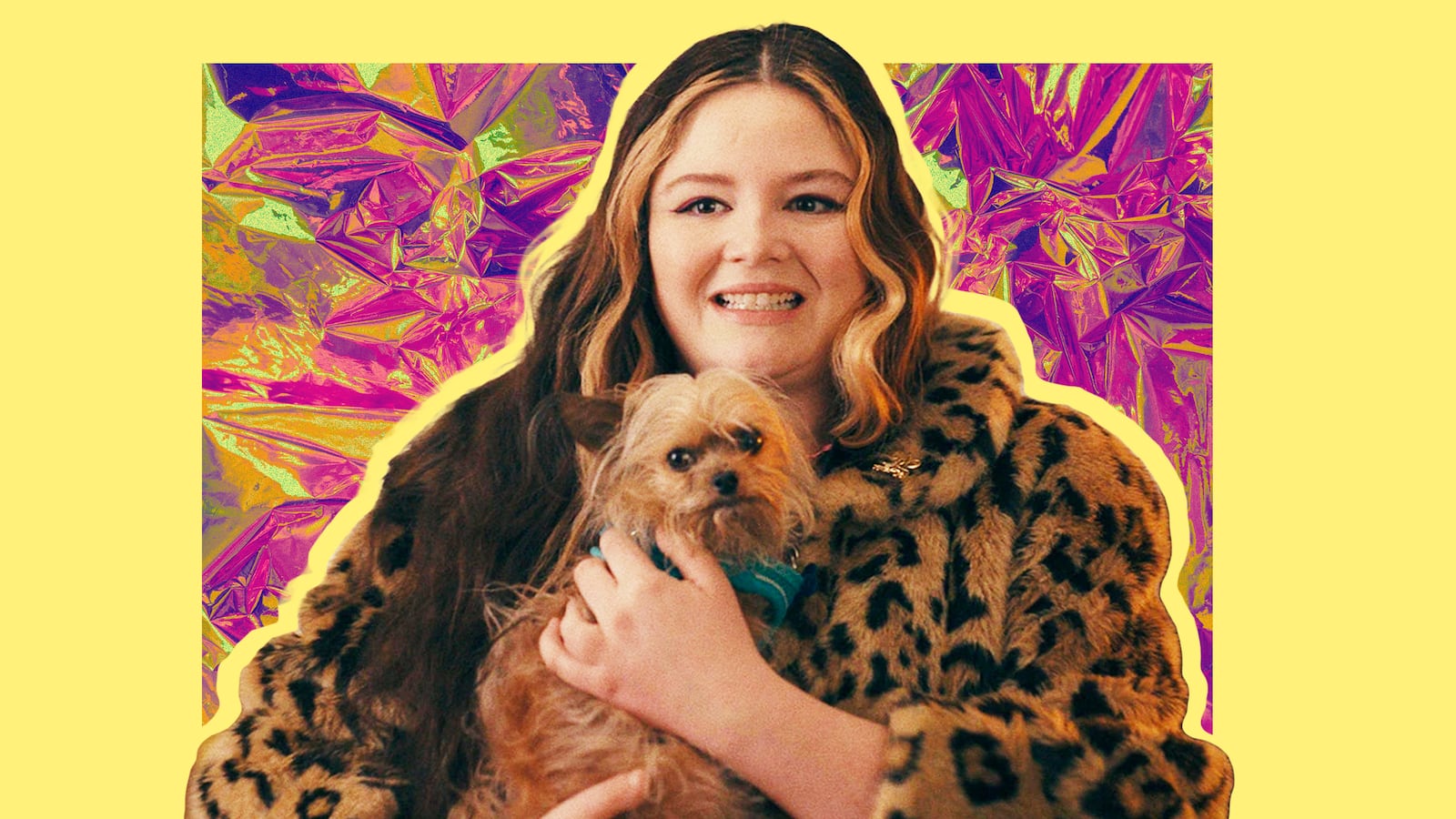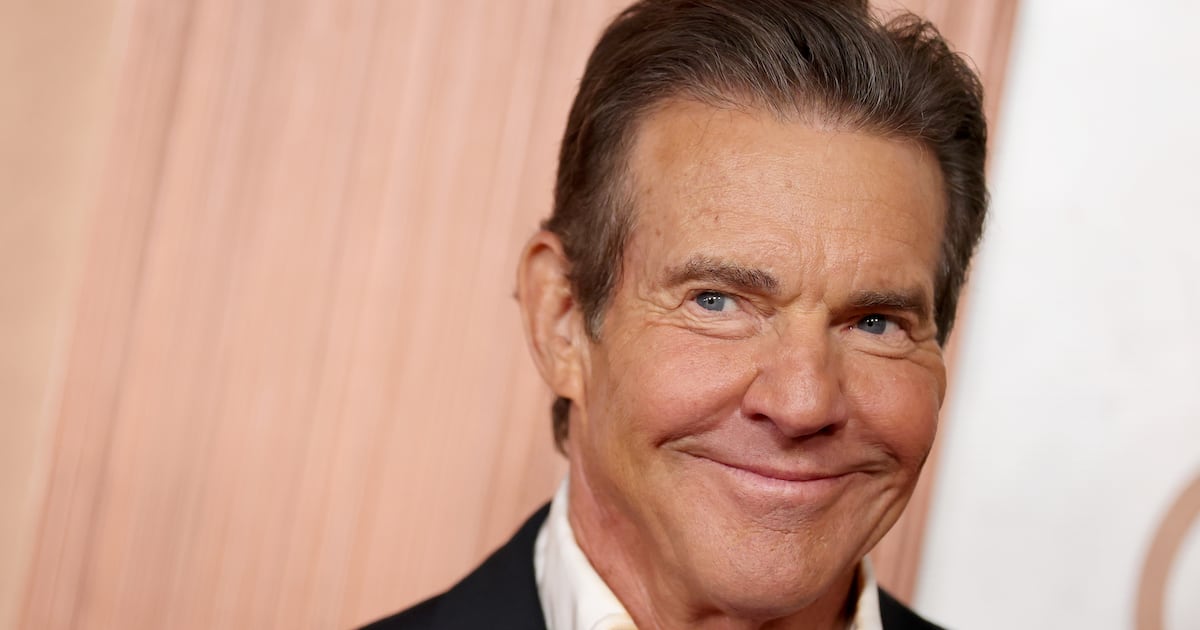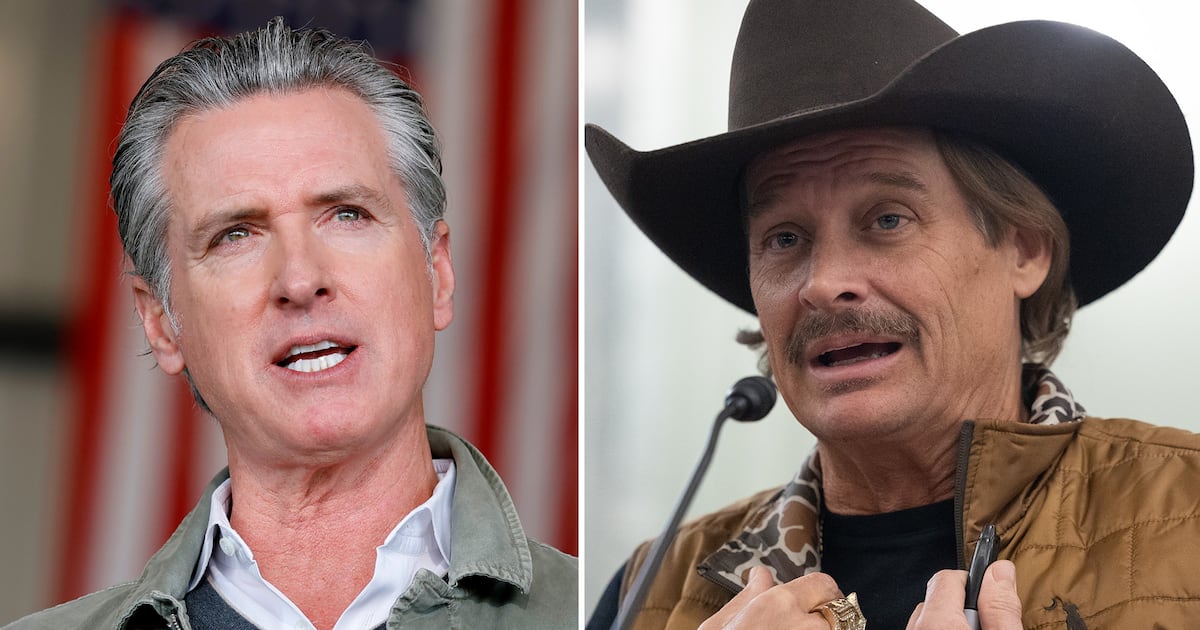When I enter Meg Stalter’s Airbnb in Austin, Texas—where she’s staying during this year’s SXSW festival—I’m shocked at the difference between our lodgings. “I love the vibe in here,” I tell her, half-forgetting that she didn’t design the space herself. I’m staying on the other side of the city, in a house decorated to suggest the Roaring Twenties-era art deco. Think velvet couches, black porcelain toilets, and a whole lot of Pâtes Baroni artwork.
“Wait, everything around it, and like, in it?” Stalter asks me about this aesthetic, seemingly as baffled as I was that the house took itself so seriously. “It’s decorated like the Roaring Twenties?” We both laugh before she asks me what I think the theme of her rented house is. I look around at the updated fixtures, mod lighting, and teal blue couch that we’re seated on, then suggest “gentrification.” She nods, motioning to an instrument that came with the house, suspiciously propped up against one of the walls as if that were the encompassing thesis of the decor: “guitar.”
Stalter—who’s here promoting Cora Bora, which had its world premiere at SXSW—is supremely welcoming, a far cry from the aloof, flighty characters you might see in some of her Instagram comedy sketches. She also doesn’t carry the air of the meddlesome nepo-baby office assistant Kayla, whom Stalter plays and steals scenes as in HBO Max’s Hacks. Instead, it feels like we’re just sitting down to shoot the shit. She’s flanked by Cora Bora’s director, Hannah Pearl Utt, and one of its producers, Mallory Schwartz, on either side of her—not because they’re trying to keep the interview in check, but because they’re now Stalter’s good friends.
“When I read Hannah’s [pitch] letter, I knew she’d be a friend for life,” Stalter says, looking back at her. “I’m really sensitive, so I can’t work with people who are mean to me, or weird to me.” She’s laughing while she says this, but I can tell it’s incredibly sincere. Stalter has a softness about her in person that’s uniquely disarming. Her geniality almost makes her fantastic performance as the abrasive Cora even more impressive.
Though Cora Bora is Stalter’s first lead role, you wouldn’t be able to tell—even if you may be unfamiliar with her other work. As Cora, Stalter deftly works both her comedic skills and dramatic chops with equal expertise. Cora is a down-and-out musician in Los Angeles, who is trying her best to string herself along with shitty gigs. She’s gotten good at developing emotional walls to keep moving forward, despite desperately missing her former bandmates and girlfriend, Justine (Jojo T. Gibbs), who still lives in Portland.

Meg Stalter and Paul W. Downs in Hacks.
HBO MaxWhen Cora moved to L.A. to try her hand at a solo career, she and Justine opened up their relationship. This lets Cora—who, like Stalter, is bisexual—fill her time with other people, to avoid thinking about her own state of flux. But when Cora senses that Justine is moving on, she starts to spiral and heads north to surprise Justine, where things inevitably go hilariously awry.
“This is the movie I’ve always wanted to do,” Stalter, who is in her early thirties, tells me. “And this is the stuff I want to do going forward. I love comedy so much. But something that has a lot of heart in it makes me laugh even more than something that’s just straight comedy.
“I messaged my manager within five minutes [of reading Hannah’s pitch deck], and was like…’We need to say yes, we need to get on Zoom, we have to meet in person!’ Because you never get sent scripts like that. It’s a queer person, an unlikeable person. I love [Cora] so much. People think she’s unlikeable at first, but she’s actually experienced a lot of loss. To read a character that has so much heart, and she’s funny, and she’s gay, this was like … a dream movie.”
While she tells me this, Stalter fidgets with a drawstring on her sweatshirt. I start to realize it isn’t so much a physical manifestation of nervousness, but rather a way to keep her hands preoccupied while her mind navigates boundless excitement.
“I’m really emotional now. Once I got to the premiere, me and Hannah took a picture, and I started sobbing in the picture. So now, there’s like Getty Images of me crying.” Stalter then mentions how anxious she was going into production on the film, considering it takes a different thematic tenor than her usual work. “Before making the movie, I was afraid that…people [would be] like, ‘Oh, she should stick to comedy.’ There’s a lot of comedy [in the movie], but it’s also very earnest.”
As we get into the film’s nitty-gritty, Stalter and I start to finish each other’s thoughts, clearly operating from similar headspaces. We both talk about how it’s nice to see a character who is not only bisexual, but also unapologetically messy and unsympathetic—a rarity in queer cinema. At SXSW, I had described the film to anyone who would listen as Obvious Child meets Portlandia, funneled through a queer lens.
Part of what makes Cora Bora so refreshing is that it’s unafraid to make its queer lead unpleasant to everyone who drifts into her orbit. There are no attempts to soften her edges or make her palatable for straight audiences. She has sex with men and women, and she’s happy to blow off her one-night stands the next day.
“There are so many bisexual people in the world, and it’s absolutely insane we haven’t seen very many of them [onscreen],” Stalter says. “And that was really exciting to me. I can relate to her in a way where I feel really deeply, like she does, and sometimes I can get very emotional about things and let that get in the way.”
The dissolution of Cora’s band is the driving force for her move to Los Angeles. And as audiences move further into Cora’s chaos, they’ll begin to understand just what happened to make her flee. While watching Cora Bora, I had the distinct (and uniquely uncomfortable) feeling of looking at Cora and seeing a version of myself. It’s unusual to see queer characters process life’s hardships, while contending with their own identity and motivations, in the way that this movie allows for.
Cora’s Portland homecoming is uncouth and sometimes hard to watch. Stalter—who, like me, hails from the Midwest—knows just how hard it can be to come home.
“I feel like I’ve really worked hard to build a life for myself outside of [my hometown in] Ohio, because I tried to do other things besides act, because I didn’t have the money to move to L.A. or New York,” she says. “So when I was living in Ohio, I was like, ‘Maybe I’ll be a nurse, maybe I’ll be a teacher.’”
I ask if this is where she draws some of her characters from, given that she’s no stranger to miming a medical professional.
“Yeah, just growing up in the Midwest…but I think that when you fall in love with yourself, you can handle new starts a little easier. And I think Cora had a hard time with a new start, because she didn’t fully love herself.”
When she says this, I mention my similar trajectory, becoming a bit lost while trying to figure out my place as a queer person in the world. It used to make going home for the holidays the perfect storm of depression and defeat. Stalter—who has already mentioned how sensitive she is more than a few times—looks as though she might start to tear up. Her aura fills the room, and I’m sure that everyone there can feel it. “I’m so glad that that changed for you,” she says, with a genuine smile. “Because I think I had a hard time when I knew what I wanted to do, but wasn’t allowing myself to go for it.”

Meg Stalter and Paul W. Downs in Hacks.
HBO MaxOne could be easily fooled, given the way that Stalter’s career has been on a steady incline since her days making videos out of her Chicago bedroom. In just a few years, Stalter has become living proof that a staunch commitment to not just your passions, but yourself, is a ticket to the moon. If you didn’t know who Meg Stalter was before, you won’t be able to escape her in 2023. Not only will Cora Bora release later this year, but Stalter also has roles in the Sundance darling Sometimes I Think About Dying, fellow SXSW hit Problemista, Chelsea Peretti’s upcoming directorial debut First Time Female Director, and the third season of Hacks.
When I roll through her upcoming release schedule, I feel like I’m about to psych her out. It’s not every day that someone gets asked what it feels like for their life and career to be on the precipice of major change.
“I think that ever since [I started to] do comedy and act…I’ve just had the best time. But this is like, my dreams really are coming true. I’ve fallen in love with every cast I’ve worked with, but with this movie in particular, I fell in love with everybody, and I had a hard time when it ended. We got to see each other every day for a month, and I got really attached to everyone.
“That’s what’s important to me,” she adds. “I’ve never wanted to be famous or anything, I just like to work with my friends. [Laughs]. I’m not saying I am famous. But the biggest dream that’s come true with all of that—Hacks, and this movie, and everything—is getting to work with my friends.”
Despite several moments in her relatively short career that are marked by major successes, Stalter may be best known as the woman behind “Hi, gay!” In a video she posted in June 2021, Stalter mocked corporations falsely bending to queer people during Pride month, to get them to buy their products via bogus promotions. In her typically offbeat fashion, Stalter portrayed a woman who owns and operates “The Butter Shop,” which has been making butter since 1945 and accepting all people “since the last four months.”
The video has since garnered 1.5 million views and will inevitably be recycled every summer for decades to come. “I love doing videos online,” she tells me early into our conversation, “but that doesn’t keep me thinking about them for my whole life.” With that in mind, I ask Stalter if she’s ever scared that, as she moves further away from her beloved internet characters, she’ll be pigeonholed into people only wanting her to do one thing.
“I think that if someone remembers me for that, that’s totally fun. But I know that I want to [act] forever. And I’m not afraid to evolve, because I already feel like I have and I always am, all of us are. I’ve never been focused on fame or my one big shot. I just know that I want to do this for a really long time.”
“Also, if someone knows me for a gay video, that makes me happy,” she adds. “If there’s anything that I wanted to go viral, it would’ve been—I don’t care about going viral! [laughs]—but if someone knows me for ‘Hi, gay,’ that’s the nicest thing to be known for. It’s friendly and gay to be known for that.”
As we talk a bit more about how Cora Bora is something entirely different from anything she’s ever done before, Utt, still sitting in the hanging wicker chair in the corner of the room, looks up. She tells me that, when she was making Cora Bora, everyone on set wanted the end result to be that people would think of Meg Stalter as a movie star.
Just like on the premiere’s red carpet a few days earlier, Stalter starts to tear up. It’s clear that making Cora Bora was a transformative experience for her, one that she views as special, not just because it could very well be her star vehicle, but because it welcomed so many new friends into her life. Wiping a tear from her eye, she looks back and forth between me and Utt, still sitting on the couch. “Oh, here we go again,” she says, laughing.






